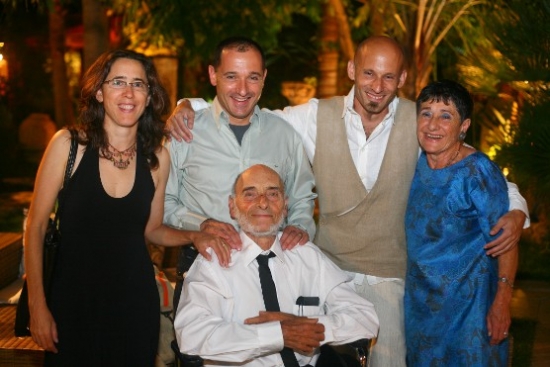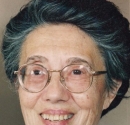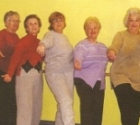
The Teutsch family at Eyal's wedding to Leticia:left to right: Nadya, Jan, Eyal, and parents Sivia & Walther (in wheel chair)
In May 2008 whilst taking part in a 10 km race, I stumbled and fell. By a strange combination of circumstances I turned a somersault and landed on my back and found that I was completely unable to move. An ambulance was called and took me to hospital. I was diagnosed as having broken two discs and was unable to move my hands, my legs and everything in between.
Six months of rehabilitation hospital care restored some use of the arms and modest use of my hands, for which I am very grateful. However, this still leaves me substantially paralysed from my ribs downwards. These musings have been written using a voice dictation facility - using a keyboard is possible only with my thumbs. It would be wholly beyond my capacity to write this piece without voice dictation.
My way of getting around, therefore, or more accurately of being got around, is in a wheelchair. There are many limitations on what one can do in a wheelchair, but one can apparently muse in one as well as anywhere else.
Medically I am defined as "quasi tetraplegic ASCI C". This is quite clear to the minority who understand it, and incomprehensible to everyone else. However, being medical terminology, it is neutral. Crippled and being crippled are disagreeable terms, but I have no trouble accepting being described, and seeing myself, as handicapped.
The politically correct will not have this. The current terminology is
"challenged". The dictionary and Thesaurus definition of this term is:
“deprived of the power to perform one or more natural bodily activities challenged.
Synonyms challenged, differently abled, exceptional, impaired, incapacitated.”
Does this leave you wiser?
In my view, challenged is a hollow euphemism that detracts from clarity. I will freely admit to not being an admirer of political correctness.
In this situation I am wholly dependent on my professional caregiver. One might think that there is complementary usage between caregiver and caretaker, but this is not so. Our copy of the SOED, which, like us, has aged somewhat, does not recognise the former word. The latter word dates only from the second half of the 19th century.
According to Wikipedia (WP), a caregiver - US usage, or carer - UK usage, is usually a family member or someone close to the subject of the care, unpaid but not necessarily voluntary. The definition offered is someone whose life is in some way restricted by the need to be responsible for the care of someone who is mentally ill, mentally handicapped, physically disabled or whose health is impaired by sickness or old age.
This WP definition only partially describes my case. On a wider canvas, it paints a very bleak picture of very many family situations. However, even in a state of affairs where there is a paid caregiver, a substantial additional load descends upon one's spouse in the situation in which we find ourselves.
For a paid caregiver, which is a contradiction in terms according to the previous definition, WP offers the following: “care worker, professional caregiver, direct support professional, personal assistant (sic), health care assistant (HCA) or care assistant”.
In contrast to the above, the Hebrew terminology is much simpler and internally consistent - metapel and metupal. This seems to me to be preferable, so abstracting from it and notwithstanding WP, I will stick with caregiver, unqualified by additional wording.
A large majority of the full-time caregivers in Israel appear to be from abroad. Statistics on the number of foreign workers in this country are notoriously unreliable. I will leave trying to discuss and evaluate them for another occasion.
There appear to be no reliable statistics for people working abroad.
An OECD survey dated 2004 shows 175 million people living abroad - migrants - in the year 2000. 46 million of these are in the USA, Canada, Australia and New Zealand, 20 million in Russia and the Ukraine. For the remaining 26 countries (then) of the OECD, with a population of 783 million, the number of migrants was 35 million. The country with the highest ratio of migrants to local population is Saudi Arabia. Together the people of the Middle East absorb 15 million migrants in a population of 121 million.
The countries with the largest number of citizens abroad in the above survey were
Russia 10.2, Mexico 7.9, India 7.2, Other West Asia 6.3, Ukraine 4.7 and Philippines 4.1 million.
Current figures are apparently much higher. For the Philippines, a more recent source gives over 8 million abroad and an annual exodus of 1.5 million. My caretaker is from that country, which makes him a Filipino. In English, there are very many ways of forming the name of its inhabitants from the name of the country. The change of consonant from Ph to F in this case is very unusual. It is made doubly unusual by the fact that it is also used in the country in question.
That's all for now folks, as the animated film used to say in the days when it was still called a cartoon. I'll go no more amusing with you fair page.
Walter Teutsch was born in Germany in 1929, went to the UK in 1939 on kindertransport, and has been in Israel since 1953. His professional career was in financial management and internal auditing in large Israeli companies.
 MEMBERSHOP PERKS-An ESRA Modiin Initiative
MEMBERSHOP PERKS-An ESRA Modiin Initiative KINDERTRANSPORT JUNE 5-6 1939
KINDERTRANSPORT JUNE 5-6 1939 HOW TO CARE FOR YOUR CHILD'S TEETH
HOW TO CARE FOR YOUR CHILD'S TEETH Yad Sarah's new house in Raanana
Yad Sarah's new house in Raanana English speaking Feldenkreis
English speaking Feldenkreis Men don't Make Passes at Girls who Wear Glasses
Men don't Make Passes at Girls who Wear Glasses Walter Teutsch
Walter Teutsch